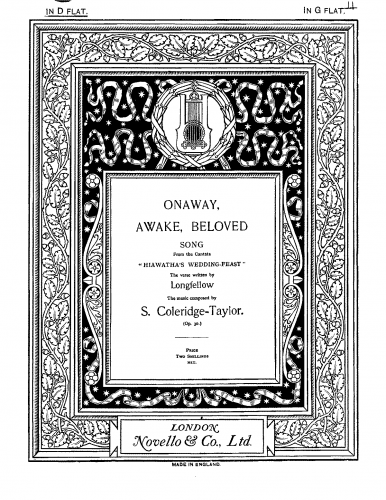Obscure Music Monday: Coleridge-Taylor's The Song of Hiawatha: Onaway! Awake, beloved!
Samuel Colderidge-Taylor (Aug. 15, 1875 - Sept. 1, 1912) was born in London, England, to Alice Hare Martin, an English woman, and Dr. Daniel Peter Hughes Taylor, from Sierre Leone. They were not married, and Daniel Taylor returned to Africa before 1875, not even knowing he had a son. Martin named her son after the poet, Samuel Taylor Coleridge, and was raised in Croydon, Surrey by his mother, and her father. Coleridge-Taylor studied violin at the Royal College of Music, and was later on appointed a professor at the Crystal Palace School of Music, and conducted the orchestra at the Croyden Conservatory. Coleridge-Taylor found success at the Three Choirs Festival in Gloucester and Worcester; he was recommended by Edward Elgar, who heard rave reviews about Coleridge-Taylor from noted music critic and editor August Jaeger. He had much success during his time, and his interest in African-American culture brought him to the States on several occasions where his success continued. He made such an impression that he was invited to the White House by Theodore Roosevelt.
One of Coleridge-Taylor's most famous works (which is relative, as he's not performed very much, though that is slowly changing) is The Song of Hiawatha, particularly the movement Onaway! Awake, beloved. The Song of Hiawatha is a trilogy of cantatas written between 1898 – 1900. The first part, Hiawatha's Wedding Feast, is where today's selection comes from. Onaway! Awake, beloved is a beautiful declaration of love, with a charming and relatively straightforward orchestra part. Coleridge-Taylor sprinkles some chromaticism at the beginning and throughout the work, which help create the warm and romantic atmosphere. The tenor sings these tender words:
Onaway! Awake, beloved!
Thou the wild-flower of the forest!
Thou the wild-bird of the prairie!
Thou with eyes so soft and fawn-like!"If thou only lookest at me,
I am happy, I am happy,
As the lilies of the prairie,
When they feel the dew upon them!"Sweet thy breath is as the fragrance
Of the wild-flowers in the morning,
As their fragrance is at evening,
In the Moon when leaves are falling."Does not all the blood within me
Leap to meet thee, leap to meet thee,
As the springs to meet the sunshine,
In the Moon when nights are brightest?"Onaway! my heart sings to thee,
Sings with joy when thou art near me,
As the sighing, singing branches
In the pleasant Moon of Strawberries!"When thou art not pleased, beloved,
Then my heart is sad and darkened,
As the shining river darkens
When the clouds drop shadows on it!"When thou smilest, my beloved,
Then my troubled heart is brightened,
As in sunshine gleam the ripples
That the cold wind makes in rivers."Smiles the earth, and smile the waters,
Smile the cloudless skies above us,
But I lose the way of smiling
When thou art no longer near me!"I myself, myself! behold me!
Blood of my beating heart, behold me!
Oh awake, awake, beloved!
Onaway! awake, beloved!
Thankfully there are a few recordings of this for you to enjoy!



Are you able to tell me when this particular recording was done - not the remake, but the original.
Thanks
Jo